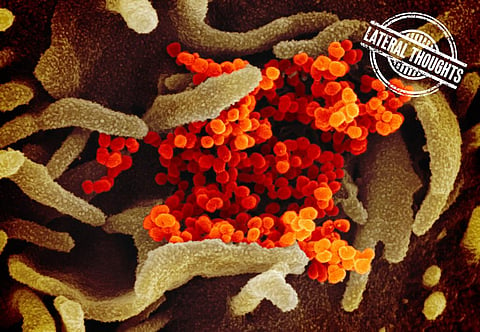COVID-19: The virus in our genes
Adhering to physical distancing norms, wearing a mask and consuming home-cooked meals may be the least of our worries when it comes to keeping the novel coronavirus SARS-CoV-2 at bay. With history as our guide, the COVID-19 pandemic may lead to long-term changes in our genetic makeup.
Each human being has 20,000-25,000 genes that constantly adapt to the changing environment. When humans migrated out of Africa, these genes changed constantly to ensure that they survived.
New diseases caused by unknown pathogens helped strengthen the immune system. These beneficial genes passed on to the modern human beings, though variations were present depending on the routes people took to reach the final destination.
Many of these genetic variations could be behind the subtle differences observed between populations in their response to SARS-CoV-2.
The genes for killer-cell immunoglobulin-like receptor (KIR) protein is one of the many genes that could be providing protection against SARS-CoV-2 in India — and subtle variations can be seen in the country itself. Indians have more of it.
Back in 2002, researchers tried to characterise the diversity of this gene in the Dravidian speaking groups — Mollukurumba, Kanikar and Paravar — of Tamil Nadu. They found that these protective genes were frequent in Paravar and Kanikar, but not in Mollukurumba.
The KIR genes in Mollukurumba group were more related to Caucasians, but researchers did not ascribe any reason to this. Nor could this evidence be used to analyse the current pandemic and incidence rates in the country for the population of only one state was studied.
Just like encounters with disease, the availability of food during the migration and settlement in different parts of the world, too, modified our genome. For example, though animals usually become lactose-intolerant after weaning, the gene-controlling lactase persistence can be inherited and variations of this gene are present in different parts of the world.
When researchers tried to estimate the age of the most recent common ancestors of each of these mutations, they found that the dates coincided with the time frame for animal domestication.
If we look at the modern-time factors that affect our genes, exposure to junk food has been found crucial. Researchers at the University of Bonn found that the immune system treats fast food — rich in fat, sugar and salt — like an infection.
This leads to inflammation and diseases such as diabetes and arthritis. This genetic reprogramming of the immune cells persisted even when the mice were shifted to a healthy diet, the researchers found.
A very crucial research question now would be to figure out if exposure to SARS-CoV-2 could bring about genetic changes, and if yes, what these changes could be. People have been responding differently to the pandemic.
While some people are going out without a care, others have barricaded their houses and limited their exposure to the outside world. Others have given up junk food and taken to home-cooked meals.
But several have stopped consuming green vegetables and meat fearing that these might be contaminated. We are exposing ourselves to multiple chemicals — soaps, bleach, sanitisers – which can lead to mutations. To add to these assaults, we have reduced physical activity and left ourselves vulnerable to chronic diseases.
Though the mind marvels at the thought of all that could happen to our bodies, we can take solace in the fact that evolution is usually a slow process.


